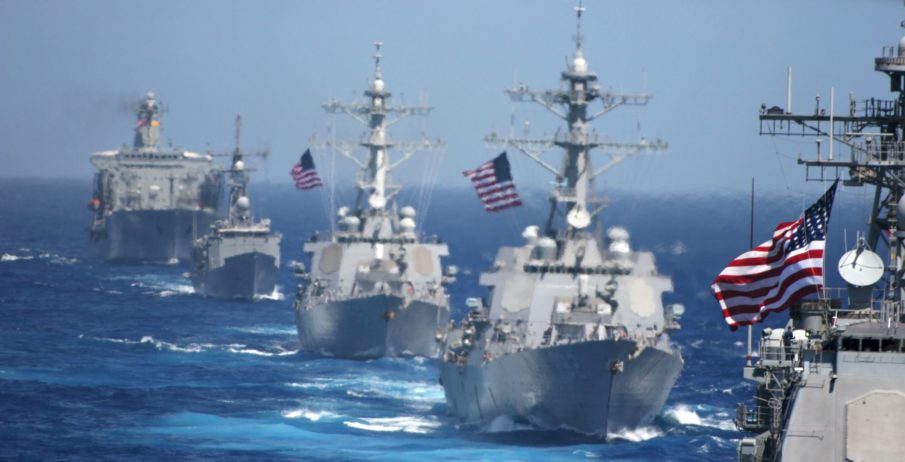International politics is not always a dynamic field of study. It is typically a field dominated by long-term trends and time-lapse analyses. Yes, there are always wars to examine and global geopolitical moves to analyze, but they are usually incremental affairs, and rarely ever threaten to upend the wider international political order. Thus, America might invade Vietnam to prevent the spread of communism, and Russia might invade Ukraine or Georgia to exert its power in its perceived strategic neighborhood. Neither move, however, greatly altered the international political order, and both were carried out within the confines of that same order.
The international political order has, in fact, pretty much remained unchanged since the end of World War II, with the exception of the collapse of the Soviet Union, which was significant, though not fundamentally order-changing. Again, that collapse fit nicely within the existing order, which in large part sought to bring it about.
The current order of the world’s political and economic system came about after the end of World War II, which saw the reorganizing of international politics and economics to reflect the outcome of the war. Thus we have the United Nations, with its five permanent, veto-wielding members of the Security Council (the war’s victors); the World Bank; the International Monetary Fund (IMF); the European Union (EU); and the North Atlantic Treaty Organization (NATO). The latter institutions have come to define international affairs over the last 70-plus years, along with other regional treaty and economic groupings.
That order is now under a growing strain, which could conceivably lead to its future collapse.
First, while the result of the “Brexit” vote in Britain remains unclear as of the writing of this article, the fact that one of the more economically powerful (if reluctant) members of the EU is seriously contemplating leaving the union is a significant blow. Add to it Greece’s economic woes of the last decade, and an immigrant crisis stemming from the war in Syria, and the EU is in real danger of sustaining a mortal wound.
In addition to the possible future collapse of the EU—admittedly a distant possibility at this time, even if Britain does choose to leave—the global financial system is also under a growing threat. China and other world powers would love to see less reliance on the dollar in international economics and the end of American global economic primacy. China has gone so far as to create its own development bank to challenge the influence and power of the World Bank. Others have called for more currencies to challenge the dollar as the global reserve currency.
Beyond the EU and global economic institutions, NATO is also under threat, vis-a-vis a United States presidential candidate and continued Russian aggression on NATO’s eastern flank. It is no secret that Russia would like to see NATO collapse, and the former never misses an opportunity to bully countries formerly within its sphere of influence into rejecting their bids to join NATO. On the U.S. side of the Atlantic, meanwhile, presumed Republican presidential nominee Donald J. Trump has repeatedly voiced skepticism about the alliance, and has called into question its usefulness and relevance.
Nor is the United Nations immune to calls for change. The makeup of the Security Council has repeatedly been challenged for years now, as countries such as Germany, Japan, Brazil, India, and South Africa make convincing claims for permanent seats and/or vetoes. These calls for UN reform cannot help but add to the overall challenge to the world political order as it currently exists.
Beyond threats to the institutions, significant geopolitical changes are also underway. Both Iraq and Syria appear to be falling apart, and the political makeup of the Middle East in the coming decades is anyone’s guess. The Kurdish people could end up with their own country, and the world could be witnessing a total re-ordering of the region, as Sykes-Picot boundaries begin to dissolve in the wake of civil wars. Time will tell on that score.
The above developments are all acting in parallel to put tremendous pressure on the world’s governing institutions. In fact, never before has the post-war consensus been as threatened with upheaval as it is today. This shouldn’t surprise informed observers as, after all, the international order has historically changed more than it has stayed the same. Unfortunately, though, those changes are usually accompanied by spasms of violence and great power war.
This author would argue that the current order is worth preserving. We do live in a pax Americana, after all, and the West, especially, should do more to preserve it. This might mean accommodating rising powers more effectively, reforming institutions as needed, and pushing back against challenges when they arise—up to and including militarily, if required.
Already have an account? Sign In
Two ways to continue to read this article.
Subscribe
$1.99
every 4 weeks
- Unlimited access to all articles
- Support independent journalism
- Ad-free reading experience
Subscribe Now
Recurring Monthly. Cancel Anytime.










COMMENTS